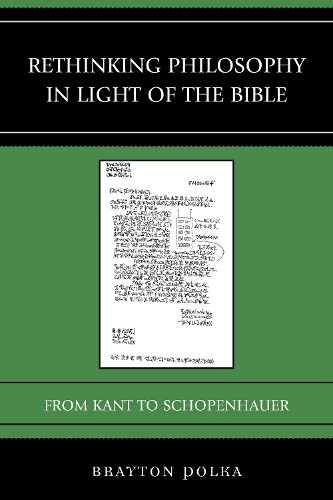
Rethinking Philosophy in Light of the Bible: From Kant to Schopenhauer
(Hardback)
Available Formats
Publishing Details
Rethinking Philosophy in Light of the Bible: From Kant to Schopenhauer
By (Author) Brayton Polka
Bloomsbury Publishing PLC
Lexington Books
15th October 2014
United States
Classifications
Tertiary Education
Non Fiction
Philosophy: metaphysics and ontology
Christianity
History of religion
210
Physical Properties
Hardback
186
Width 162mm, Height 237mm, Spine 19mm
413g
Description
Rethinking Philosophy in Light of the Bible analyzes the ideas that are central to the philosophy of Kant, Hegel, and Kierkegaard in order to show that they are biblical in origin, both ontologically and historically. Brayton Polka argues that Schopenhauer has an altogether false conception of the fundamental ideas of the Biblecreation, the Fall of Adam and Eve, and covenantal loveand of Christianity, which leaves his philosophy irredeemably contradictory, as he himself acknowledges. The aim, then, is to show that our modern values, the values that constitute modernity, are biblical in origin. It is only when we come to understand that modernity is biblical from the beginning and that the Bible is modern unto the end that we are able to overcome the opposition, so evident today, between philosophy and theology, between reason and faith, and between the secular and the religious. Polka makes central the distinction that Kierkegaard draws between Christianity and Christendom: Christianity represents the coming into historical existence of the single individual; Christendom represents Christian values that are rationalized in pagan terms. As Kierkegaard shows us, if God has always existed eternally, then he has never existed eternally, then he has never come into historical existence for the single individual. The distinction between Christianity and Christendom is the distinction not between faith and reason, but between truth and idolatry. While theology and philosophy each represent the truth of Christianity, Schopenhauers idolatrous concepts of faith, no less than of reason, represent Christendom.
Reviews
Polkas close, critical readings of texts by Kant, Hegel, Kierkegaard, Feuerbach, and Schopenhauerwill interest students and scholars of any of these philosophers, in addition to those following (or participating in) efforts to rethink secularism. . . .Polkas project of critical examination, in light of the Bible, of core concepts in Kant, Hegel, Kierkegaard, Feuerbach, and Schopenhauer is a model of the synthesis of scholarly erudition and bold synopsis characteristic of the best philosophy in the hermeneutical tradition. Polkas prose, at times densely lyrical, always chiseled and polished, is well suited to his argument and to the intellectual tradition to which he contributes. A sign of Polkas meticulous attention to detail: typos and grammatical offenses are nonexistent in the book. * The European Legacy Toward New Paradigms *
A brave and bracing account of the flaws at the heart of modern philosophy and their overcoming in Kant, Hegel, and Kierkegaard. As with all of Polkas works, the thinkers may not be treated as you expect. The moves Polka makes may not be readily embraced. But this thinking is for all readers in modernity. We dont need Polkas book to know what he knows; we need Polkas book to know what there is to know, and to expose the confusions of knowing (and doing) otherwise. This is not self-help. This is critique. -- Nancy Levene, Yale University
Polkas new book explores with great tenacity and verve the foundational import for modernity of the myth of the fall. The author provides robust, careful readings of some of the central documents of modern philosophy organized around this still under-examined topic. A great virtue of the book is how it forces us to reconsider many of the platitudes and pieties in recent thinking about secularism. -- Ian Balfour, Professor of English, York University
Author Bio
Brayton Polka is professor emeritus of humanities and social and political thought at York University.
